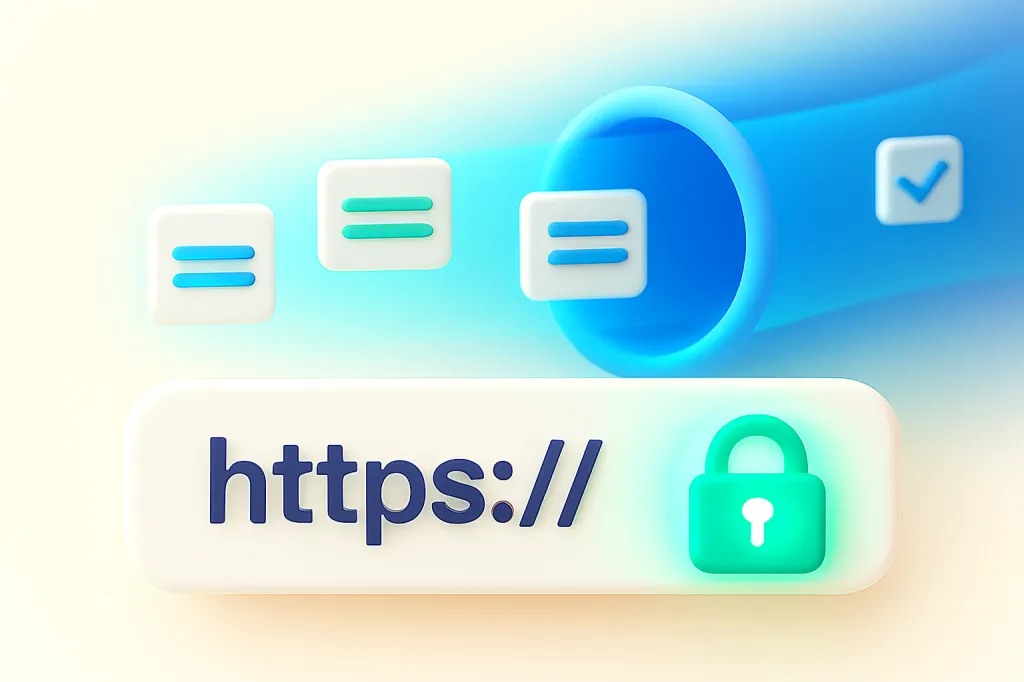Have you ever noticed the little padlock icon in your browser's address bar when visiting a website? That small symbol is one of the most powerful trust signals on the internet. It indicates that the site is using HTTPS, and it's all made possible by something called an SSL Certificate.
Many new website owners know they should have that padlock, but often don't understand what it really means, how it works, or why it's absolutely critical for their success. This guide will demystify SSL and HTTPS, explaining the technology in simple terms and outlining its crucial benefits for security, user trust, and, most importantly, your SEO rankings.
What is an SSL Certificate? (Your Website's Digital Passport)
Think of an SSL Certificate as a digital passport for your website. It serves two primary functions:
- Authentication: It verifies your website's identity, proving to visitors' browsers that they are connected to the real, legitimate server for your domain and not an imposter.
- Encryption: Once verified, it establishes a secure, encrypted connection between that server and the user's browser.
SSL stands for Secure Sockets Layer. Although the technology has been updated to Transport Layer Security (TLS), the term "SSL" is still widely used. When a website has a valid SSL certificate installed on its server, it can move from HTTP to the secure HTTPS protocol.
HTTP vs. HTTPS: What's the Real Difference?
To understand the importance of SSL, you need to understand the difference between HTTP and HTTPS.
- HTTP (Hypertext Transfer Protocol): This is the standard protocol for viewing websites. When you use an HTTP connection, all data exchanged between your browser and the server is sent as plain text. Analogy: It's like sending a postcard. Anyone who intercepts it along the delivery route can read the entire message.
- HTTPS (Hypertext Transfer Protocol Secure): This is the secure version of HTTP. The "S" stands for "Secure." When you use an HTTPS connection, all data is encrypted. Analogy: It's like sending a sealed, armored briefcase. Only the sender and the intended recipient have the key to open it.
Why HTTPS is a "Must-Have" for Every Modern Website
In the past, only e-commerce or banking sites used HTTPS. Today, it is a fundamental requirement for all websites, and here's why.
1. Security and Data Protection
This is the most obvious benefit. HTTPS encrypts all data sent to and from your website. This includes sensitive user information like login usernames and passwords, contact form submissions, and credit card details. Without encryption, this data is vulnerable to being intercepted and stolen by hackers on insecure networks (like public Wi-Fi).
2. Building User Trust
Modern web browsers like Google Chrome and Firefox now actively penalize non-secure sites. If your website is still using HTTP, visitors will see a prominent "Not Secure" warning in the address bar. This warning is alarming and will cause many users to immediately leave your site, assuming it's unsafe. Conversely, the green padlock icon is a universal symbol of trust and professionalism, assuring visitors that their connection is private and secure.
3. A Confirmed Google Ranking Signal
This is critical for traffic. Back in 2014, Google officially announced that HTTPS is a ranking factor. This means that if two websites are equal in all other aspects, the one using HTTPS will rank higher in search results. While it's considered a "lightweight" signal, it can be the tie-breaker that puts you ahead of your competition. A secure web is a priority for Google, and they reward sites that comply.
4. Required for Modern Browser Features
Many new and powerful web technologies and browser APIs now require a secure HTTPS connection to function for privacy reasons. This includes features like geolocation (accessing a user's location), service workers (which power Progressive Web Apps), and push notifications. If you plan to use these modern features, HTTPS is mandatory.
How Do You Get an SSL Certificate?
The great news is that getting an SSL certificate is now easier and more affordable than ever. For most website owners, it's completely free.
- Let's Encrypt (Free SSL): Most reputable web hosting providers now offer free, automatically renewing SSL certificates from Let's Encrypt. You can typically enable it with a single click from your hosting control panel (like cPanel). For blogs, portfolios, and small business websites, a free Let's Encrypt certificate provides all the security you need.
- Paid SSL Certificates: For large e-commerce sites or corporations, there are paid SSL options (like Organization Validation and Extended Validation certificates) that provide a higher level of identity verification and come with warranties.
Conclusion
HTTPS is no longer an optional upgrade; it is the modern standard for the web. An SSL certificate is a fundamental component of any successful website, providing essential security, building visitor trust, and giving you a direct advantage in SEO. If your site is still running on HTTP, make it your #1 priority to switch. It's one of the easiest and most impactful improvements you can make. ✅





